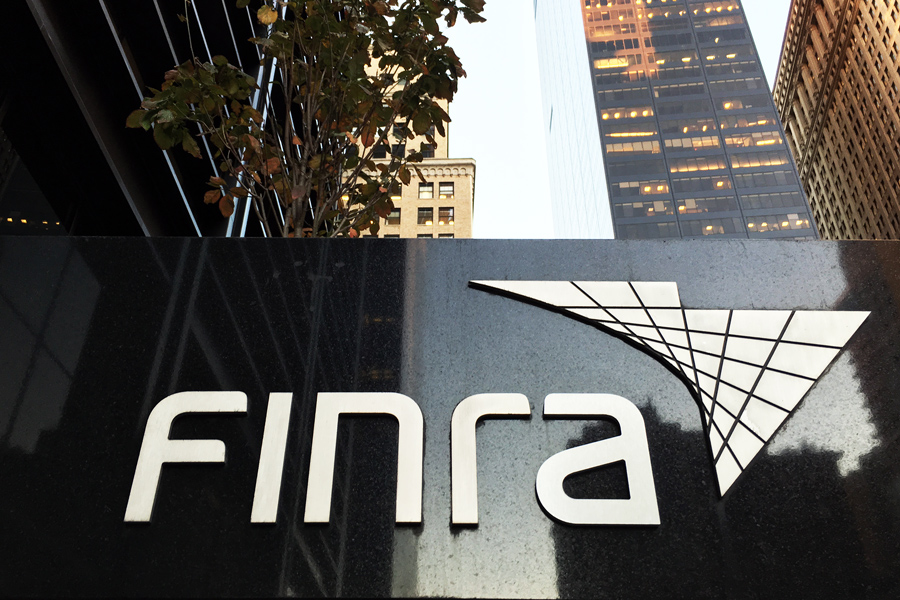

Finra is proposing to increase regulatory fees on member brokerage firms beginning in 2022 to help close a structural budget deficit while funding expanding oversight responsibilities, the organization said Friday.
The Financial Industry Regulatory Authority Inc. will phase in from 2022 to 2024 a total of $225 million in hikes across three fee categories -- the gross income assessment, the the trading activity fee and fees based on the number of registered representatives a firm employs -- the brokerage industry self-regulator said in a plan filed with the Securities and Exchange Commission.
In a letter to member firms, Finra Chief Executive Robert Cook and Finra board chair Eileen Murray said the average firm would experience a 0.06% increase in the affected fees as a percentage of its revenues over the next five years, assuming no increase in its revenue.
The proposal said the total fee increase represents a 5% compounded annual growth rate across all Finra fees between this year and full implementation in 2024.
“As we look forward, we are confident that the plan … will put Finra on a firmer financial footing to support our mission in the years to come and offer member firms additional certainty and transparency regarding their regulatory costs,” Cook and Murray wrote.
As the brokerage industry shrinks -- reducing Finra’s fee income -- and as its regulatory mandate expands, the Finra board has been wrestling with revenue challenges.
“The necessity of addressing fees has been a long time coming and has been part of board conversations for more than a decade now,” said Jack Brennan, a former Finra board chair and chairman emeritus of Vanguard. The proposal “seems to me to be prudent in the balance of cost and doing [Finra’s regulatory] job as well as they can.”
Finra has not increased core regulatory fees since 2013 and has not imposed any significant increase since 2010, the proposal states. From 2010 through 2019, Finra has drawn more than $600 million from its reserves, or investment accounts, to defer fee increases. The reserve usage represented an average of 6.6% of Finra’s operating budget each year.
Finra will continue to tap reserves for the next two years before implementing the fee increases. But it is giving firms a warning of what’s to come.
“Finra is moving forward at this time to establish a transparent framework under which it can provide member firms with significant advance notice of the increase, permit the increase to be phased in over multiple years, and continue to strategically spend down our reserves over the next several years,” the proposal states.
Finra said that its total expenses grew at less than the rate of inflation from 2010 through 2019. In its 2019 annual report, Finra said overall expenses grew by 11% to a total of $1.095 billion in 2019, up from $975 million in 2018. Finra’s net revenues were $938.5 million in 2019, an increase of 2.2% when compared to 2018, when it reported $918.5 million in net revenues. Finra has projected another operating loss for 2020.
There’s only so much the regulator can do to tighten its belt, said Mark Cresap, a former board member and founder of Cresap Inc., a financial advisory firm.
Cresap said the increasing complexity of financial markets and products, as well as new regulations Finra must enforce -- such as Regulation Best Interest, the new broker investment advice standard -- means the organization can’t slash its operating costs the way a private-sector firm could.
“It’s difficult for Finra to be as nimble with expenses as the industry would like them to be,” Cresap said. “I have to credit them with doing a lot to reduce their expenses. I would consider [the fee increase proposal] fair considering the challenges they face to narrow that gap between revenue and expenses.”
The SEC would have to approve the Finra fee increase. The agency also can open a public comment period on the proposal. The timeline for the process is not clear.
Finra oversees approximately 3,517 brokerages and 630,000 registered representatives.

Relationships are key to our business but advisors are often slow to engage in specific activities designed to foster them.

Whichever path you go down, act now while you're still in control.

Pro-bitcoin professionals, however, say the cryptocurrency has ushered in change.

“LPL has evolved significantly over the last decade and still wants to scale up,” says one industry executive.

Survey findings from the Nationwide Retirement Institute offers pearls of planning wisdom from 60- to 65-year-olds, as well as insights into concerns.
Streamline your outreach with Aidentified's AI-driven solutions
This season’s market volatility: Positioning for rate relief, income growth and the AI rebound
